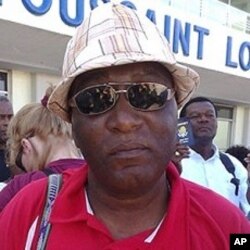More international rescue teams, medical supplies, food and clean water are arriving in Port-au-Prince late Friday to help the victims of Tuesday's earthquake in Haiti. VOA correspondent Brian Wagner reports the big problem now is how to bring the supplies to people.
He spoke with relief/rescue personnel and victims at the Port-au-Prince airport Friday. In the photo gallery we hear from Al Perez of the Miami-Dade Fire Rescue, Aldo Gonzalez with the Red Cross of El Salvador, Andrew Davis, a missionary from Baltimore, Maryland, and Haiti residents Jean Coby and Lionel Moyes.
WAGNER: I am at the international airport in Port-au-Prince, the staging ground for what has becoming an increasingly large international effort to help this country recover from the devastating earthquake. Cargo and passenger planes continue to come night and day. We have seen planes from the United States, Canada, Israel, Venezuela, and Russia. Some of the planes are dropping off food, water, rescue equipment, and other supplies and tools that the [rescue] teams will need.
Rescue and aid workers also are arriving. Just a few moments ago a team from the San Francisco, California, area left the airport to help the Haitians in need. A team from the U.S. state of New Jersey loaded their trucks and headed on their way.
One of the most important questions we have heard from Haitians is when is the aid going to be handed out to them and their neighborhood. We saw a group of young men gathered at the airport this morning [Friday] who had clearly come in the hopes of getting something; food, water, anything to help them get through the next few days. Representatives of different aid groups are conscious of the need to get things into peoples' hands as fast as they can.
I put that question to Wayne Robinson, a team leader with Shelter Box, which distributes temporary shelters to people in disasters. He said his team is working as fast as they can.
ROBINSON: We have 930 shelter boxes in the air right or soon to be in the air. Once we get them on the ground here, we feel we will be able to get them through customs. We have volunteers lined up and sites identified so we can put them out into the community in Port-au-Prince and the surrounding area.
In the last day or so the United States and French governments have started running passenger flights out of the country [Haiti] for evacuees from those countries. People line up and wait for a plane to arrive so they can leave Haiti and leave behind what is a very difficult, traumatic experience for many.
One man I talked to is Lionel Moyes who is a U.S. military veteran and whose family is from Haiti. He grew up in the United States, but he decided with his retirement he would move back to Haiti to give something back to the people here. The earthquake has changed his plans, at least for now.
MOYES: I spoke with my children [who live in the U.S.] last night and they though I was dead. I am happy to hear from them and they know I am okay. I am on my way back home [to the United States].
WAGNER: You think you will ever come back to Haiti?
MOYES: No doubt about it. I will be back, but not right away. It is difficult to stay right now because it is not a healthy condition with the smoke and smell of death.
WAGNER: The sun is setting right now in Port-au-Prince. From we have have heard today [Friday], the situation outside the airport remains much the same. People are gathering in plazas and other large areas waiting for aid to arrive. Aid workers say help is on the way. The question is how long can hold on until it gets there.








